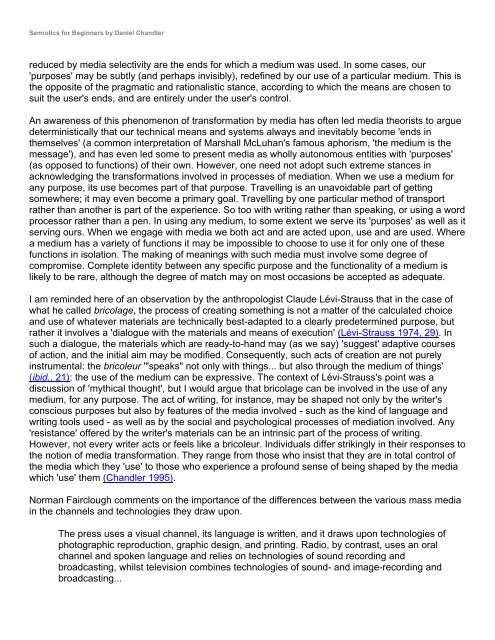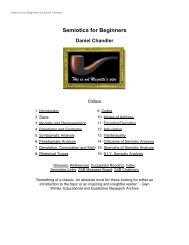Semiotics for Beginners by Daniel Chandler
Semiotics for Beginners by Daniel Chandler
Semiotics for Beginners by Daniel Chandler
Create successful ePaper yourself
Turn your PDF publications into a flip-book with our unique Google optimized e-Paper software.
<strong>Semiotics</strong> <strong>for</strong> <strong>Beginners</strong> <strong>by</strong> <strong>Daniel</strong> <strong>Chandler</strong><br />
reduced <strong>by</strong> media selectivity are the ends <strong>for</strong> which a medium was used. In some cases, our<br />
'purposes' may be subtly (and perhaps invisibly), redefined <strong>by</strong> our use of a particular medium. This is<br />
the opposite of the pragmatic and rationalistic stance, according to which the means are chosen to<br />
suit the user's ends, and are entirely under the user's control.<br />
An awareness of this phenomenon of trans<strong>for</strong>mation <strong>by</strong> media has often led media theorists to argue<br />
deterministically that our technical means and systems always and inevitably become 'ends in<br />
themselves' (a common interpretation of Marshall McLuhan's famous aphorism, 'the medium is the<br />
message'), and has even led some to present media as wholly autonomous entities with 'purposes'<br />
(as opposed to functions) of their own. However, one need not adopt such extreme stances in<br />
acknowledging the trans<strong>for</strong>mations involved in processes of mediation. When we use a medium <strong>for</strong><br />
any purpose, its use becomes part of that purpose. Travelling is an unavoidable part of getting<br />
somewhere; it may even become a primary goal. Travelling <strong>by</strong> one particular method of transport<br />
rather than another is part of the experience. So too with writing rather than speaking, or using a word<br />
processor rather than a pen. In using any medium, to some extent we serve its 'purposes' as well as it<br />
serving ours. When we engage with media we both act and are acted upon, use and are used. Where<br />
a medium has a variety of functions it may be impossible to choose to use it <strong>for</strong> only one of these<br />
functions in isolation. The making of meanings with such media must involve some degree of<br />
compromise. Complete identity between any specific purpose and the functionality of a medium is<br />
likely to be rare, although the degree of match may on most occasions be accepted as adequate.<br />
I am reminded here of an observation <strong>by</strong> the anthropologist Claude Lévi-Strauss that in the case of<br />
what he called bricolage, the process of creating something is not a matter of the calculated choice<br />
and use of whatever materials are technically best-adapted to a clearly predetermined purpose, but<br />
rather it involves a 'dialogue with the materials and means of execution' (Lévi-Strauss 1974, 29). In<br />
such a dialogue, the materials which are ready-to-hand may (as we say) 'suggest' adaptive courses<br />
of action, and the initial aim may be modified. Consequently, such acts of creation are not purely<br />
instrumental: the bricoleur '"speaks" not only with things... but also through the medium of things'<br />
(ibid., 21): the use of the medium can be expressive. The context of Lévi-Strauss's point was a<br />
discussion of 'mythical thought', but I would argue that bricolage can be involved in the use of any<br />
medium, <strong>for</strong> any purpose. The act of writing, <strong>for</strong> instance, may be shaped not only <strong>by</strong> the writer's<br />
conscious purposes but also <strong>by</strong> features of the media involved - such as the kind of language and<br />
writing tools used - as well as <strong>by</strong> the social and psychological processes of mediation involved. Any<br />
'resistance' offered <strong>by</strong> the writer's materials can be an intrinsic part of the process of writing.<br />
However, not every writer acts or feels like a bricoleur. Individuals differ strikingly in their responses to<br />
the notion of media trans<strong>for</strong>mation. They range from those who insist that they are in total control of<br />
the media which they 'use' to those who experience a profound sense of being shaped <strong>by</strong> the media<br />
which 'use' them (<strong>Chandler</strong> 1995).<br />
Norman Fairclough comments on the importance of the differences between the various mass media<br />
in the channels and technologies they draw upon.<br />
The press uses a visual channel, its language is written, and it draws upon technologies of<br />
photographic reproduction, graphic design, and printing. Radio, <strong>by</strong> contrast, uses an oral<br />
channel and spoken language and relies on technologies of sound recording and<br />
broadcasting, whilst television combines technologies of sound- and image-recording and<br />
broadcasting...




